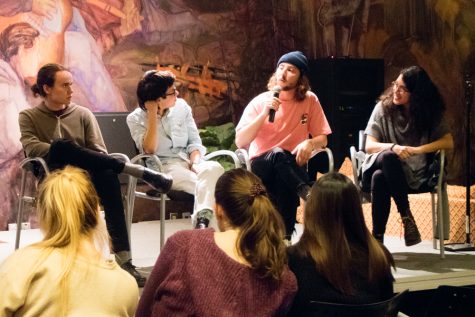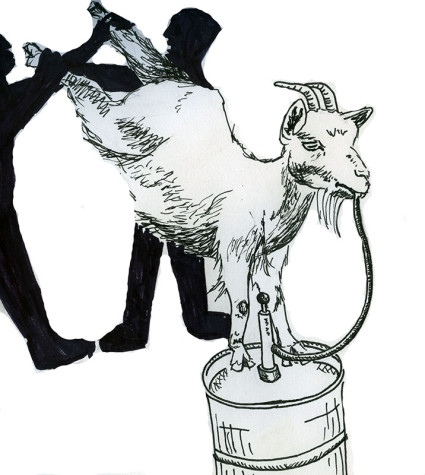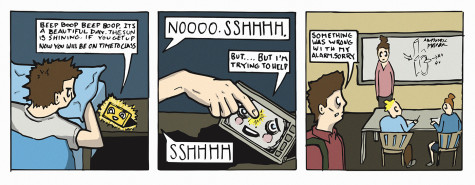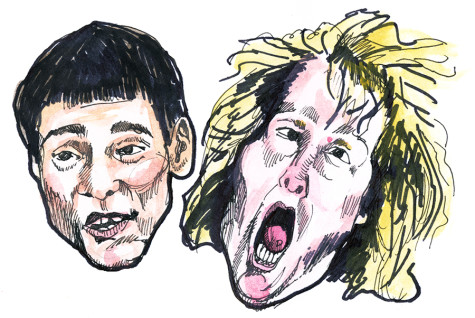Birkenstock Recall leaves Whitman students shoeless
November 13, 2014
Illustration by Emma Rust.
Birkenstock Orthopädie GmbH & Co. KG, the German company that manufactures Birkenstocks, announced Friday that they are recalling all Birkenstocks bought since February 2007. The company is worried about a mad cow disease contamination in the leather.
Mad Cow Disease, a neurodegenerative disease that originates in cattle, can easily spread to humans though contaminated meat from the intestines, brains and hide. This recall was prompted after a drunken man in Northampton, England developed CJD, the human form of the disease after being dared to eat a piece of a pair of Birkenstocks. As a result, all Birkenstocks have been pulled from shelves and Birkenstock owners are urged to either mail their Birkenstocks, put them designated drop off bins or let Whitman Security burn them.
This recall has not only worried the Whitman community but has created a cultural shock that’s magnitude hasn’t been seen since (insert major culture changing event here). Sixty-five percent of students own a least either a right or a left Birkenstock sandal and 60 percent own two shoes.
As President George Ponts explained, “Economic ineq –– ahem –– I mean, Birkenstock recalls affect everybody here at Whitman. The school is in charge of student safety, and thus any student seen wearing the recalled Birkenstocks will have them impounded and will be injected with Mio Energy by the Health Center staff to boost immune system function.”
“It is God’s gift to western medicine, especially the peach flavor,” responded the Health Center when questioned about Mio Energy’s effect on the disease.
Beside the health effects of having a small bottle of Mio Energy pumped into their blood streams, many students are undergoing an identity crisis as an integral piece of their style is removed.
“Birkenstocks were who I was, my being. I now find myself forgetting my own name, and feel like an empty shell,” said junior Mary Sims.
In addition, many friends who felt they had a lot in common now feel that all that’s left in their friendship is that they are both white, middle class and still cannot spell the word “tomorrow.” Aid groups have sprung up all over campus asking for donations and notes to support students feeling lost.
Some students do not feel any sympathy for those affected.
“I’m glad Birkenstocks have left campus. Not only did they appropriate German culture, they also looked hideous,” said one student who wished to remain anonymous due to past death threats from speaking out against Teva sandals. This student hasn’t been seen since talking with The Pioneer and is assumed to be one of the many dissidents who have disappeared after speaking out against Whitman culture.
Many Whitties feel this is a learning experience, particularly Dirk Jenkins of the Biology Department who studies agriculture in the United States.
“This is an example of monoculture just like bananas, in which one specie is almost used exclusively,” he said. “Thus when disease strikes, rather than just a small part of the system falling apart, the whole thing falls apart.”
Whether it’s injecting students with artificially flavored and colored energy boosters, comparing shoes to agriculture, losing your identity or speaking out against Birkenstocks and then waking up the next day in a sewage gutter in the streets of Katmandu, Nepal after being drugged and dumped there by ASWC, every individual on the Whitman campus has experienced the effects of the Birkenstock recall. The whole experience can be summed up by Revolutionary War patriot Thomas Paine’s famous response to the recall and loosing his pair of Birkenstocks whose foot bed he spent five years molding perfectly to the shape of his foot when he said, “These are the times that try men’s soles.”
Joseph Wood is a pseudonym.










